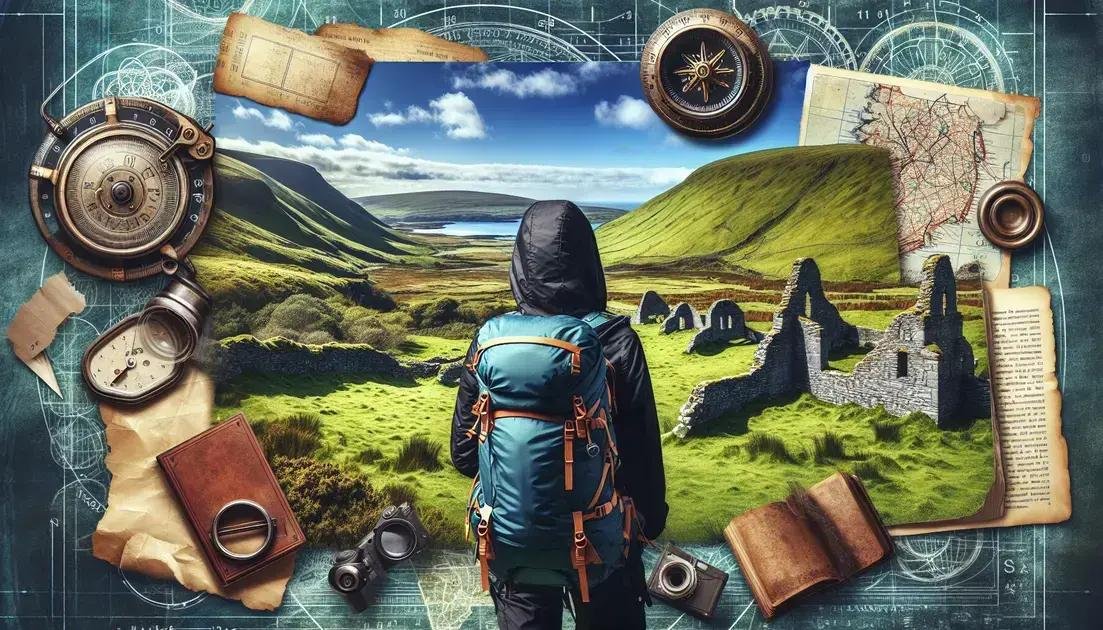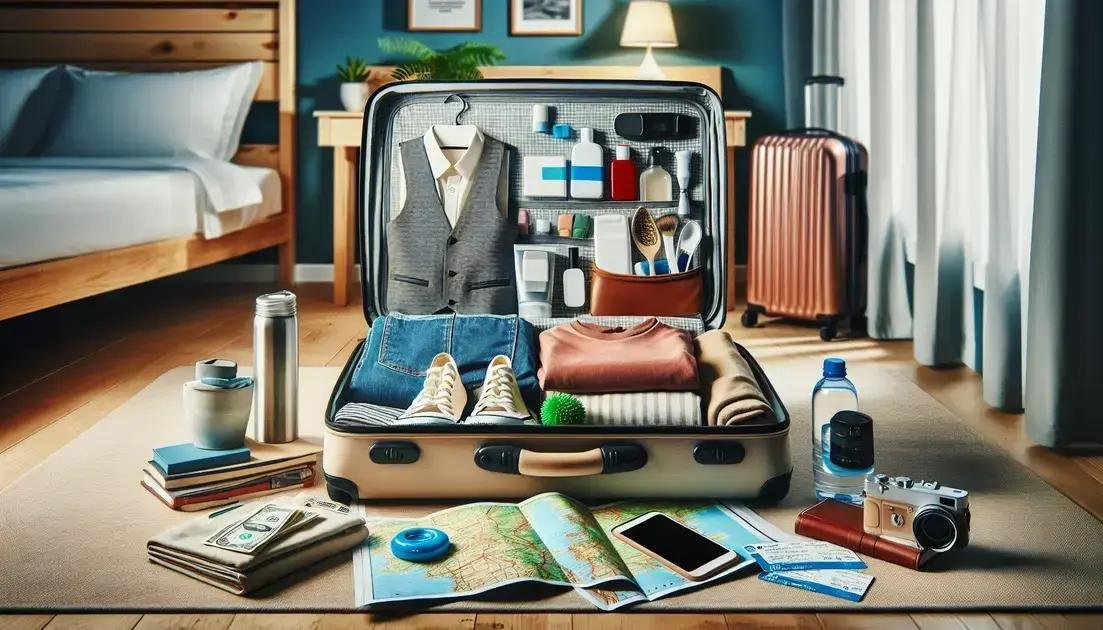
Dreaming of visiting Ireland but worried about costs? Discover how cheap travelling within the lush landscapes and vibrant cities of Ireland can be both exhilarating and affordable.
From enchanting castles to stunning cliffs, our comprehensive guide helps you explore the Emerald Isle without breaking the bank.
Read on to find out how you can enjoy a memorable trip with our budget-friendly tips and optimize your travel experience to this beautiful country.
Best Time to Visit Ireland on a Budget
Traveling to Ireland doesn’t have to break the bank. Considering the best time to visit when planning your budget trip can make a significant difference. Timing your visit right helps avoid the peak tourist season prices and allows you to enjoy Ireland’s charm without the crowds.
Late spring, specifically May and early June, offers a perfect balance between reasonable weather and fewer tourists. Many attractions remain open, yet the costs of accommodation and flights are substantially lower compared to July and August. Additionally, you can take advantage of the beautiful natural landscapes Ireland has without paying peak-season prices.
Consider visiting in early autumn too. September and October are ideal as the weather remains mild, but the summer tourist crowds have subsided. During these months, hotels and hostels often lower their rates, and airlines may offer off-peak deals, making it easier to find affordable flights and accommodation.
Don’t forget the possibility of experiencing Ireland in winter. With proper packing, you can enjoy the country’s stunning scenery alongside attractive winter festival events. Although some attractions might have reduced hours, the peaceful atmosphere and lower travel costs can be worth it.
Make sure to check out flight comparison websites and keep an eye out for discount airlines flying into Ireland. Booking in advance can also bring substantial savings.
Affordable Accommodation Options

When planning a budget-friendly trip to Ireland, finding affordable accommodation is key to keeping costs low. Thankfully, Ireland offers a range of options for travelers seeking value without sacrificing comfort.
Hostels are an excellent choice for budget-conscious travelers, providing a social environment and affordable dormitory-based accommodations. Many hostels also offer private rooms if you prefer more privacy. The Hostelling International (HI) network offers great options across major cities like Dublin, Cork, and Galway, providing kitchens and common areas that make it easy to prepare your own meals, saving even more money.
Another
affordable option
is bed and breakfasts, known for their warm hospitality and personal touch. These accommodations often include a hearty breakfast, contributing to your savings on meals. Additionally, you’ll find a range of Airbnb listings throughout Ireland, from shared spaces to entire homes, catering to a variety of budget ranges.
For a truly unique experience, consider booking a stay at one of Ireland’s many camping and caravan parks. These offer an affordable way to see the countryside while staying in close proximity to nature reserves and scenic areas. Many parks provide affordable rental options for tents and caravans, making them accessible for those without their own equipment.
No matter which type of accommodation you choose, planning in advance and comparing prices online can help ensure you get the best rates. Websites like Booking.com or Hostelworld often feature last-minute deals and discounts, so it’s worth keeping an eye out rather than booking at the first option you see.
Cheap Transportation Tips
Traveling through Ireland on a budget can be a delightful experience if you employ a few clever cheap transportation tips. Use public transportation systems, like buses and trains, which are more cost-effective than renting a car for long distances. Leap Cards are great for saving money on Dublin’s public transport and can be used on the bus, tram, and train services throughout the city.
Consider using coaches for intercity travel as they often offer competitive rates compared to trains. Companies like Citylink or Bus Éireann provide affordable options. Moreover, taking these buses allows you to see the countryside without worrying about driving on the opposite side of the road.
For the adventurous, carpooling or using ride-sharing apps can be both economical and a unique way to meet locals. Websites like BlaBlaCar or Facebook groups for car shares can offer surprising savings.
Another tip is to walk or rent bicycles when exploring cities to cut costs while experiencing local life up close. Dublin, Galway, and other city centers are relatively compact and can be explored easily by foot or bike. Renting a bicycle is inexpensive and gives you flexibility without the pressure of timetables.
Furthermore, always check for transport discounts or passes aimed at tourists, such as the Irish Explorer Rail Pass for unlimited travel across Ireland or the Dublin Pass for discounted entry and transportation around the city. These can provide significant savings if you plan on visiting multiple cities or attractions.
Remember, planning ahead and being flexible with your travel dates and routes can also lead to big savings. Consider traveling during off-peak times or taking night services which are usually cheaper and free up your daytime for exploration.
Must-See Free Attractions

Exploring Ireland doesn’t have to break the bank. With a little planning, you can enjoy many amazing sights without spending a single euro. Discover the charming landscapes and rich history through self-guided walking tours. Cities like Dublin and Galway offer fascinating walking routes that take you past iconic landmarks and vibrant streets, all free of charge.
In each city, you’ll find breathtaking parks. For instance, Phoenix Park in Dublin, one of the largest enclosed parks in Europe, offers visitors lush greenery and open spaces to relax. You might even spot some wild deer roaming around.
Take a scenic drive or hike around the Ring of Kerry for stunning coastal views and picturesque landscapes dotted with quaint villages. In Northern Ireland, visit the Giant’s Causeway, a UNESCO World Heritage site renowned for its unique rock formations, all accessible without paying an entrance fee.
Step into Ireland’s past with free entry to many historical attractions. The National Museum of Ireland in Dublin welcomes guests to explore its extraordinary collections covering archaeology, decorative arts, and folk life. Art enthusiasts will appreciate the Irish Museum of Modern Art (IMMA), where entry to the main exhibitions is often free.
County Clare is home to the awe-inspiring Cliffs of Moher, where you can gaze upon their majestic drop into the Atlantic Ocean. Although parking fees apply, the walk itself is cost-free for those who arrange different transportation.
Finally, don’t miss the chance to experience local culture at numerous free events and festivals throughout the year. Whether you’re in the mood for traditional Irish music or a bustling market, you are sure to find an event that pleases.
By focusing on these must-see free attractions, travelers can immerse themselves in the beauty and culture of Ireland, while keeping their budgets intact.
Budget-Friendly Eating in Ireland
Exploring Ireland doesn’t have to be costly, and one of the best ways to save money is through food. Embrace the local cuisine by visiting traditional pubs and eateries where you can savor hearty Irish stew or a classic fish and chips meal without breaking the bank. Many small towns offer delightful cafés with affordable lunch options, and the portions are often generous to keep you satisfied.
For a truly authentic experience, consider farmers’ markets in cities like Dublin or Galway. Not only are these markets abundant with fresh produce and local ingredients, but you’ll also find vendors serving up delicious and affordable treats. This is a perfect way to enjoy gourmet flavors without the high price tag of city center restaurants.
Another tactic is to benefit from lunch specials. Many restaurants offer budget-friendly deals during lunchtime that are significantly cheaper than the dinner menu. Take advantage of these offers to enjoy fine dining experiences at a fraction of the cost. Additionally, keep an eye out for early bird specials at various pubs which offer full meals either at lunch or early dinner times for a discounted rate.
Consider self-catering options by staying in accommodations with kitchen facilities. This allows you to cook your own meals using fresh, locally sourced ingredients, which can be a more economical and healthier option. Visit local grocery stores or markets and get creative with your cooking; this not only saves money but also immerses you in the local culture by experimenting with Irish recipes.
Don’t overlook community events and festivals where you might find food stalls offering street food and local delicacies at reasonable prices. These events provide a lively atmosphere and a chance to taste a variety of foods from across the country without spending too much.
Discounts and Offers to Look For

When planning a budget-friendly trip to Ireland, it’s essential to keep an eye out for the best discounts and offers available. Many attractions, such as museums and historical sites, often have discounts for students, seniors, or families. Make sure to bring any eligible identification to take advantage of these opportunities.
For transportation, consider purchasing a travel pass or pre-booking your tickets online, as these options can often come with significant savings. Checking for seasonal promotions is also a savvy way to reduce transportation costs. Look for group ticket offers if you’re traveling with friends or family.
Accommodation in Ireland can be expensive, but many booking websites offer special deals and discounts, especially for early bookings. Opt for staying during the weekdays when prices might be lower, and compare different platforms to ensure you get the best price.
Additionally, subscribing to newsletters from your favorite travel sites can keep you informed about flash sales and limited-time promotions. Some hotels and hostels offer rewards programs which can earn you free nights or exclusive discounts.
Don’t forget to check out the Visit Ireland website for potential package deals that might include discounted rates on attractions and transportation. Consider off-peak seasons, during which many services offer attractive discounts to encourage travelers.
Lastly, use discount apps and websites dedicated to travel savings, which offer daily updated offers on dining, accommodations, and tourist spots. These platforms can provide you with access to Irish adventures without breaking the bank.
How to Save Money on Tours
When traveling through Ireland, how to save money on tours can significantly impact your budget. Opting for self-guided tours using audio guides or apps can provide insights and stories of the area without the hefty price tag of a personal guide. Many museums and historical sites offer these guides either for free or at a nominal cost. Consider booking tours in smaller groups or off-peak times to take advantage of discounted rates. Group discounts are often available if you are traveling with family or a group of friends, so it’s worth inquiring about them.
Free Walking Tours
Participating in free walking tours in major cities like Dublin or Galway is a fantastic way to explore and learn about local history. Though they are free, consider tipping the guide if you enjoy the experience. These tours provide flexibility in budgeting, as you decide the value of the guide’s narration through your tip.
Booking tours in advance online often comes with early bird discounts. Searching for online deals on platforms that specialize in tourist activities can lead to substantial savings compared to purchasing onsite. Multi-attraction passes can also offer great value. They not only help skip the lines but also provide access to multiple attractions for a fixed price.
Avoid hidden costs by inquiring ahead of time if there are any additional fees not included in the listed price. This ensures you don’t exceed your budget unexpectedly. Lastly, consider touring with local community organizations, which sometimes offer experiences hosted by residents. These can be uniquely enriching and more economical.
Backpacking Tips for Ireland

Ensure you pack light for an enjoyable backpacking trip through Ireland. This not only makes it easier to move around but also reduces transportation costs. A compact and versatile backpack is essential for navigating both urban areas and lush countryside.
Pack a waterproof jacket and sturdy walking shoes as Ireland’s weather can be unpredictable. Layers are key since the climate shifts rapidly, and having multi-purpose clothing can save space in your bag.
Bring a travel adapter for your electronic devices, as Ireland uses the British-style plug. A universal adapter might be a wise choice if you’re traveling from outside the UK.
Don’t forget a refillable water bottle. Many towns offer free public water fountains, allowing you to stay hydrated without extra cost.
Utilize local markets for fresh produce and budget-friendly options. This helps keep food expenses down compared to always dining out.
Take advantage of free attractions such as hiking trails, national parks, and scenic viewpoints, which are abundant in Ireland and offer breathtaking experiences without any fees.
Connect with other travelers via hostels or social media groups to exchange tips and recommendations. They can provide invaluable insights into cheap and free things to do around the country.
Finally, consider downloading maps and travel guides to your phone in advance. This ensures you stay informed and avoid data charges while on the road.
Shopping Savvy for Souvenirs
When it comes to souvenirs, staying within budget is essential. Ireland offers a plethora of unique items that won’t break the bank. Here are some tips to help you navigate the souvenir shopping scene smartly.
Visit local markets and artisan shops. They’re not only cheaper than tourist hubs, but you also get the chance to pick up authentic handmade items such as woolen scarves, pottery, and Celtic jewelry. Remember to haggle tactfully; it’s quite common in these settings and can lead to surprising discounts.
Postcards, while simple, serve as beautiful mementos and are incredibly affordable. Each card can capture a different aspect of Ireland’s breathtaking landscapes and culture. Consider collections instead of single items; sets bought together often cost less than individual prices.
If you’re purchasing for multiple people, look for multi-buy deals or discounts on bulk purchases. Some stores offer incentives such as ‘buy two, get one free’, allowing for greater savings. Also, keep an eye out for off-peak deals in stores, particularly in smaller towns, as prices can vary.
Another great way to save is by picking up items that are not officially tagged as souvenirs but are distinctly Irish. Think locally produced jams, teas, or spices that deliver a taste of Ireland. Many grocery stores have these authentic goods at a fraction of the usual prices you’d find in souvenir shops.
Finally, utilize tax-free shopping incentives for non-EU tourists. Ensure you save your receipts to qualify for VAT refunds, increasing savings on larger purchases. This extra step can mean significant savings, especially on higher-value items.
Using Public Transport Effectively

Traveling through Ireland on a budget involves making the most out of public transport. The network of buses and trains in this charming country is extensive and can be a wallet-friendly way to explore. Understanding the Schedule is crucial to effective use. Most major cities and towns are well connected, but some rural areas may require careful planning to reach. It’s wise to take advantage of Leap Cards, which make bus and train travel cheaper. These cards offer discounted fares and can be used seamlessly across multiple modes of transport including Dublin Bus, Luas, and DART services.
While planning your journey, it’s advisable to check the Transport for Ireland website for up-to-date information on routes and times. Advanced booking, especially for longer train journeys, can sometimes secure reduced rates. Consider using Bus Éireann for intercity travel, which is generally more economical than trains.
Another tip is to plan trips during off-peak hours to ensure seats and enjoy a quieter experience. If you’re backpacking, night buses might help save on accommodation costs. And don’t forget to explore options for cycling routes and bike-sharing schemes in urban areas, offering sustainable and budget-friendly alternatives to traditional public transport.
Local Festivals and Free Events
Exploring Local Culture: Immersing yourself in local festivals and events is a fantastic way to experience Irish culture without breaking the bank. From vibrant parades to traditional music and dance performances, there’s always something happening in the towns and cities across Ireland.
One of the most famous events is the St. Patrick’s Festival, celebrated nationwide around March 17th. This iconic festival offers a myriad of free events, including colorful parades, free concerts, and cultural exhibitions. Each town showcases its own unique style, making it an unforgettable experience for everyone.
Embrace the Art Scene: During the summer months, the Galway Arts Festival offers a mix of live performances, street art, and free workshops. The lively atmosphere and stunning art displays provide entertainment for all ages. Likewise, the International Arts Festival in Dublin is noted for its open-air theater performances and art installations.
Capture the Spirit of Community: Many smaller towns host their own local fairs and markets, especially during the harvest season. Places like Dingle and Killarney often have free live music and community gatherings that tourists are welcomed to join. These events are perfect opportunities to mingle with locals and enjoy traditional foods and crafts.
Seasonal Celebrations: The Halloween Festival in Derry, with its parades and fireworks, has gained a reputation for being one of the top free festivals in Europe. Similarly, the New Year’s Eve Festival in Dublin offers free events, including concerts and cultural displays, perfect for ringing in the new year in style.
Attending these festivals and events not only offers entertainment but also enriches your travel experience, providing insight into the culture and traditions of Ireland without costing a fortune.
Packing Smart for Budget Travel

Packing efficiently is essential when traveling on a budget. It not only saves money on baggage fees but also makes moving from place to place more manageable. Start by creating a versatile wardrobe that meets various weather conditions you’ll encounter in Ireland. Layers are your best friend; consider packing light sweaters and a waterproof jacket, as Irish weather can be unpredictable.
Choose a durable yet lightweight backpack that can be easily carried if you intend to use public transport frequently. This makes navigating busy streets and public transportation much more straightforward. Vacuum bags can be a game-changer for maximizing space, allowing you to pack more efficiently without overloading your bags.
Multi-purpose items help stretch your travel budget further. A scarf, for example, can double as a blanket on overnight buses or trains. Similarly, a sarong can be used as a beach towel or even a curtain for privacy in shared accommodations. Packing a refillable water bottle can save money on bottled water purchases, and many cafes in Ireland offer free refills.
Basic toiletries are often expensive on the road, so pack travel-sized options to last your trip. Solid toiletries like shampoo bars not only take up less space but also reduce the risk of spillage in your bag. Don’t forget a universal travel adapter and portable charger to ensure your devices are always ready to capture unforgettable moments.
Keep an eye on your luggage’s weight to avoid extra fees at airports. Use a small digital scale to weigh your bags before heading to the airport. Lastly, packing cubes can help organize your belongings, making it easier to locate items without unpacking everything. Efficient packing helps reduce stress and focus more on experiencing your Irish adventure on a budget.
RELATED POSTS
View all


